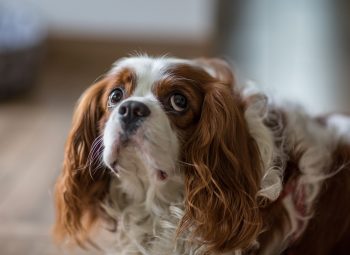The Cavalier King Charles Spaniel, with its expressive eyes and gentle demeanor, is a beloved breed known for its affectionate nature and elegant appearance. These dogs are cherished for their companionship and adaptability, fitting into various lifestyles with ease. However, as with any breed, there are certain challenges associated with owning a Cavalier. Prospective owners need to understand these aspects to ensure they can provide the best care for their pets. This article aims to offer a balanced perspective by discussing seven downsides to owning a Cavalier King Charles Spaniel, while still acknowledging the many wonderful qualities that make them such a popular and beloved breed. Understanding these challenges will help potential owners make informed decisions and enjoy a fulfilling relationship with their Cavalier.
7 Reasons Why Cavaliers Might Not Be Right For You
Prone to Certain Health Issues: Cavaliers can be susceptible to specific health problems, including mitral valve disease, syringomyelia, and hip dysplasia. Being aware of these health risks and committing to regular veterinary care is essential for their well-being.
Grooming Requirements: Their beautiful, long coat requires regular grooming to keep it free of mats and tangles. Cavaliers also tend to shed, which means more frequent vacuuming and brushing to keep their coat in top condition.
Separation Anxiety: Known for their strong attachment to their owners, Cavaliers can suffer from separation anxiety. This can lead to destructive behaviors or excessive barking if they are left alone for extended periods.
Not Ideal for Very Active Lifestyles: While Cavaliers enjoy walks and playtime, they are not as suited to very active lifestyles as some other breeds. They are more content with moderate exercise and can be prone to overexertion.
Training Challenges: Cavaliers are intelligent but can sometimes be distractible and sensitive, which may pose challenges in training. Consistent, gentle training methods work best for this breed.
Cost of Ownership: The financial commitment of owning a Cavalier includes potential veterinary bills for health issues, grooming costs, and quality food. It’s important to consider these expenses before bringing a Cavalier into your home.
Not Ideal Guard Dogs: Due to their friendly and trusting nature, Cavaliers are not suited for roles as guard dogs. They are more likely to greet strangers with affection than suspicion, which may not align with the needs of those seeking a protective breed.
Owning a Cavalier King Charles Spaniel can be a deeply rewarding experience filled with affection and companionship. While they do come with certain challenges, being aware and prepared for these aspects can lead to a harmonious and joyful relationship. Cavaliers, with their loving nature and elegant grace, can bring immense joy and warmth to the right home, making the efforts of their care well worth it.
On The Other Hand…
5 Positive Qualities About Cavaliers
Affectionate and Loving: Cavalier King Charles Spaniels are renowned for their affectionate nature. They thrive on human companionship and form strong bonds with their family members, making them excellent lap dogs and cuddle companions.
Good with Children and Other Pets: Cavaliers are known for their gentle and friendly disposition, which makes them great pets for families with children and other animals. They are typically patient and tolerant, creating a harmonious environment in multi-pet households.
Adaptable to Various Living Situations: Due to their moderate size and calm temperament, Cavaliers can adapt well to different living situations, including apartments and homes without large yards. They are content with regular walks and indoor play, fitting comfortably into various lifestyles.
Intelligent and Trainable: Cavaliers are intelligent and eager to please, making them relatively easy to train. They respond well to positive reinforcement methods and can learn a variety of commands and tricks, making them delightful participants in obedience training.
Relatively Low Exercise Needs: While they enjoy walks and playtime, Cavaliers do not require extensive physical exercise, which makes them suitable for less active owners or those with limited mobility. Their exercise needs can typically be met with daily walks and indoor play sessions.
Cavalier King Charles Spaniels possess a range of qualities that make them desirable pets for many people. Their loving nature, friendliness with children and other pets, adaptability to various living situations, trainability, and moderate exercise requirements combine to make them a wonderful choice for a wide range of dog owners. These attributes, coupled with their charming appearance, ensure that Cavaliers bring joy and companionship to their families.
The post Are Cavaliers The Worst Dog? – Food for Thought appeared first on iHeartDogs.com.

